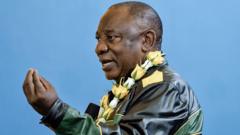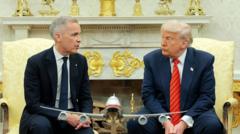Analysts assess the potential outcomes of Ramaphosa's high-stakes diplomatic mission amidst racial tensions.
**Can Cyril Ramaphosa Bridge the Divide with Donald Trump?**

**Can Cyril Ramaphosa Bridge the Divide with Donald Trump?**
South African President aims to restore US relations during pivotal White House meeting.
In a significant diplomatic engagement, South African President Cyril Ramaphosa is set to meet President Donald Trump at the White House, marking a pivotal moment in the often fractured relationship between South Africa and the United States. Ramaphosa, who previously played a crucial role as Nelson Mandela's negotiator to dismantle apartheid, faces the daunting task of mending ties with an unpredictable American leadership amid ongoing tensions.
Ramaphosa has expressed a strong desire to improve trade relations, a sentiment echoed during his visit to Washington. "The trade relations are what's most important... We want to strengthen those relations," he stated as he prepared for direct talks with Trump. Despite existing frictions, the South African president hopes to lay the groundwork for mutually beneficial agreements.
Recent disputes, including contentious claims from Trump about potential "genocide" faced by South African Afrikaners, have further complicated matters. Trump's comments and policies, particularly following legislative changes in South Africa regarding land expropriation, have soured the bilateral relationship, leading to cuts in US aid and diplomatic tensions.
Political analysts highlight this meeting's dual potential outcomes. On one hand, cooperative and productive discussions could revive relations; alternatively, clashing stances on contentious issues like land reform could escalate already fraught dialogues. Notably, Ramaphosa has brought a delegation comprising key cabinet ministers to engage in conversations regarding the extension of the African Growth and Opportunity Act (AGOA), which has significant implications for South African exports.
The trip is underscored by a sense of urgency, as concerns rise about the potential non-renewal of AGOA, crucial for South Africa’s economy. Ramaphosa's spokesperson emphasized that the meeting would be part of a longer-term strategy to normalize diplomatic affairs and improve trade opportunities.
Amid these discussions, local critics, including representatives from the opposition parties, are also part of the delegation, hinting at a broader and more inclusive approach to South Africa's international engagement. Ramaphosa's ability to navigate this complex landscape relies heavily on his negotiation prowess and a willingness to find common ground.
Furthermore, the South African delegation intends to address humanitarian issues, including the ongoing crisis in Gaza, seeking to focus on areas of consensus with the Trump administration.
"South Africa will not come to the table with a begging bowl," stated Mr. Magwenya, highlighting the reciprocal needs between both nations. As both countries stand to gain from a stronger partnership, analysts agree that this meeting represents a crucial first step toward rebuilding a strained relationship in an evolving geopolitical landscape.
Ramaphosa has expressed a strong desire to improve trade relations, a sentiment echoed during his visit to Washington. "The trade relations are what's most important... We want to strengthen those relations," he stated as he prepared for direct talks with Trump. Despite existing frictions, the South African president hopes to lay the groundwork for mutually beneficial agreements.
Recent disputes, including contentious claims from Trump about potential "genocide" faced by South African Afrikaners, have further complicated matters. Trump's comments and policies, particularly following legislative changes in South Africa regarding land expropriation, have soured the bilateral relationship, leading to cuts in US aid and diplomatic tensions.
Political analysts highlight this meeting's dual potential outcomes. On one hand, cooperative and productive discussions could revive relations; alternatively, clashing stances on contentious issues like land reform could escalate already fraught dialogues. Notably, Ramaphosa has brought a delegation comprising key cabinet ministers to engage in conversations regarding the extension of the African Growth and Opportunity Act (AGOA), which has significant implications for South African exports.
The trip is underscored by a sense of urgency, as concerns rise about the potential non-renewal of AGOA, crucial for South Africa’s economy. Ramaphosa's spokesperson emphasized that the meeting would be part of a longer-term strategy to normalize diplomatic affairs and improve trade opportunities.
Amid these discussions, local critics, including representatives from the opposition parties, are also part of the delegation, hinting at a broader and more inclusive approach to South Africa's international engagement. Ramaphosa's ability to navigate this complex landscape relies heavily on his negotiation prowess and a willingness to find common ground.
Furthermore, the South African delegation intends to address humanitarian issues, including the ongoing crisis in Gaza, seeking to focus on areas of consensus with the Trump administration.
"South Africa will not come to the table with a begging bowl," stated Mr. Magwenya, highlighting the reciprocal needs between both nations. As both countries stand to gain from a stronger partnership, analysts agree that this meeting represents a crucial first step toward rebuilding a strained relationship in an evolving geopolitical landscape.


















